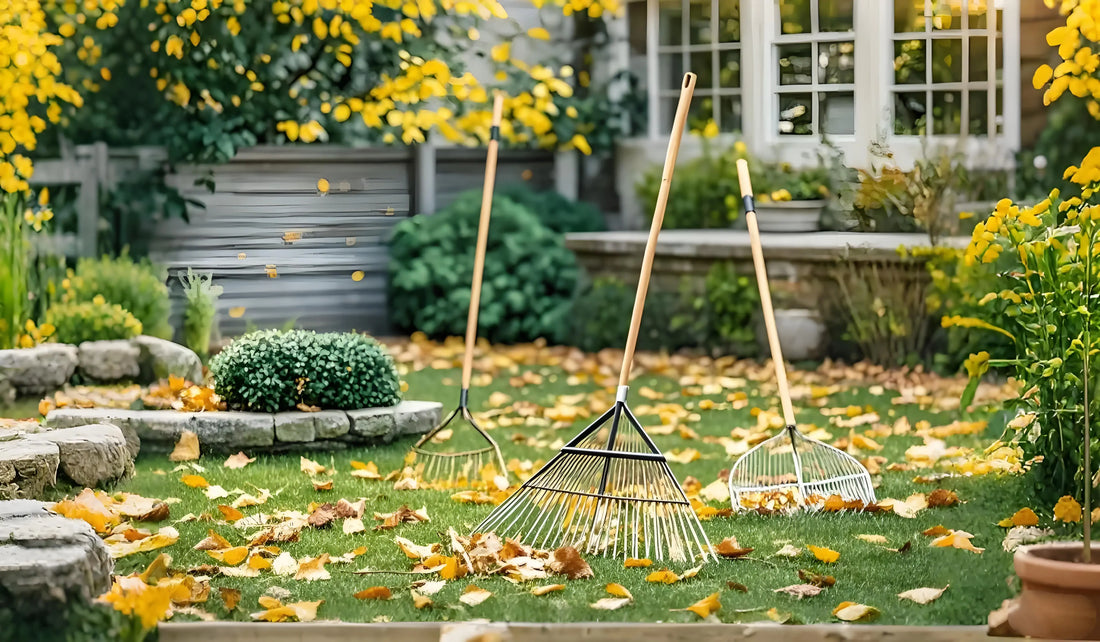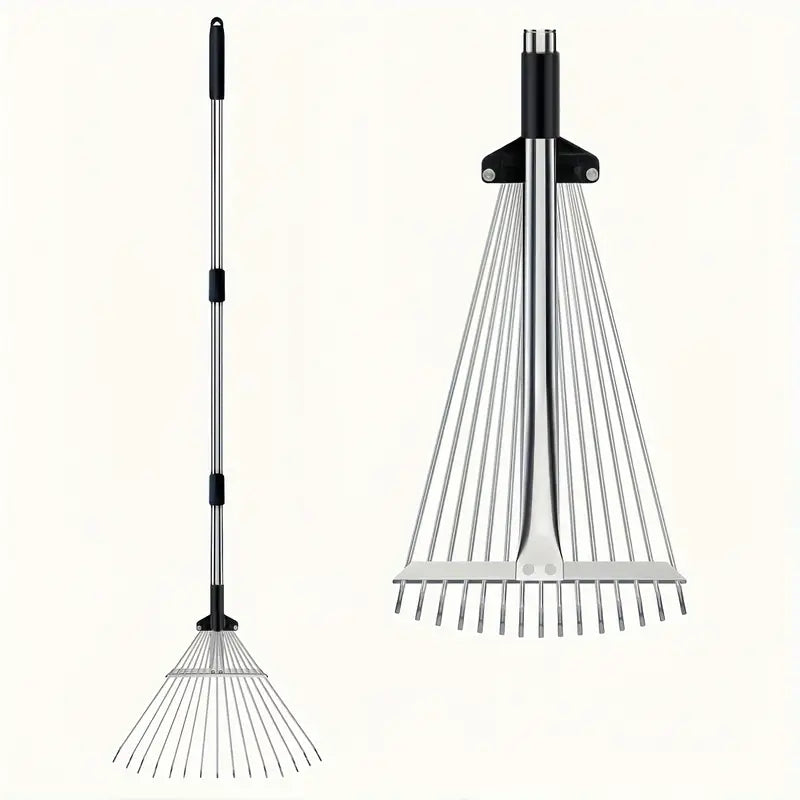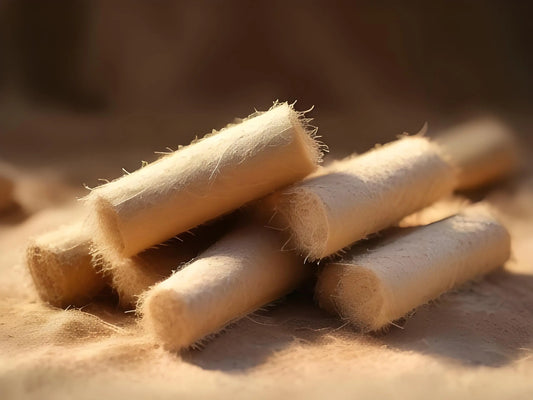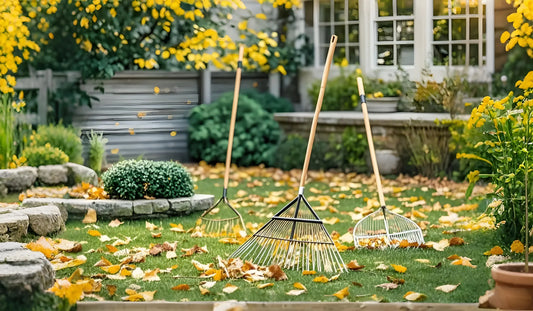
The Ultimate Guide to Leaf Rake Types
Table of Contents
IntroductionTypes of Leaf Rakes by Material
- Plastic Rakes
- Metal Rakes
- Wooden Rakes
- Small Rakes
- Large Rakes
- Short-handled Rakes
- Long-handled Rakes
- Leaf Rakes
- Thatch Rakes
- Shrub Rakes
- Adjustable Rakes
Conclusion
Introduction
Choosing the right leaf rake can transform yard work from a tedious chore into an efficient and even enjoyable activity. With a plethora of rake types available, understanding the differences in materials, sizes, lengths, and purposes is crucial. This guide aims to help you navigate these options and select the best rake for your needs, ensuring your lawn remains pristine throughout the year.
Types of Leaf Rakes by Material
Plastic Rakes
- Characteristics: Lightweight and affordable, plastic rakes are made from durable materials that are gentle on lawns but may not handle heavy debris well.
-
Ideal Uses: Best for small to medium-sized lawns with light leaf fall, offering easy maneuverability and storage.

Metal Rakes
- Characteristics: Known for durability, metal rakes (steel or aluminum) handle heavy-duty tasks but are heavier.
- Ideal Uses: Suitable for large yards with significant debris, ideal for rigorous use over time.
Wooden Rakes
- Characteristics: Classic appearance and sturdy build; requires maintenance to prevent wear.
- Ideal Uses: Perfect for gardens where aesthetics are important, suitable for those willing to invest in maintenance.
Types of Leaf Rakes by Size
Small Rakes
- Characteristics: Lightweight and easy to handle; great for precision but not efficient for large areas.
- Ideal Uses: Perfect for small gardens, flower beds, or areas needing precision.
Large Rakes
- Characteristics: Cover more ground quickly but can be cumbersome; require more effort.
- Ideal Uses: Best for expansive lawns with significant leaf fall, prioritizing efficiency.
Types of Leaf Rakes by Length
Short-handled Rakes
- Characteristics: Provide control and precision, but require more bending, which can strain the back.
- Ideal Uses: Ideal for detailed work in flower beds or around delicate plants.
Long-handled Rakes
- Characteristics: Reduce bending, comfortable for extended tasks, and cover large areas efficiently.
-
Ideal Uses: Perfect for large lawns and those who prefer to work standing upright.

Types of Leaf Rakes by Purpose
Leaf Rakes
- Characteristics: Designed for efficient leaf collection with a wide, fan-shaped head.
- Ideal Uses: Regular leaf cleanup in areas with significant leaf fall.
Thatch Rakes
- Characteristics: Effective for removing thatch and aerating soil with sharp tines.
- Ideal Uses: Ideal for lawns needing regular dethatching and aeration.
Shrub Rakes
- Characteristics: Small and narrow, designed for tight spaces around shrubs.
- Ideal Uses: Perfect for gardens with shrubs or tight planting arrangements.
Adjustable Rakes
- Characteristics: Offer versatility for different tasks with adjustable width.
-
Ideal Uses: Suitable for homeowners needing flexibility in gardening tasks.

Tips for Choosing the Right Leaf Rake
- Consider Your Yard Size: Larger yards benefit from long-handled and large rakes, while smaller yards suit compact options.
- Evaluate the Debris Type: Heavy debris requires metal rakes; light leaves can be managed with plastic rakes.
- Think About Storage Space: Limited storage? Consider collapsible or smaller rakes.
| Category | Type | Characteristics | Ideal Uses |
| Material | Plastic Rakes | Lightweight,affordable,gentle on lawns,less robust for heavy debris |
Small to medium lawns,light leaf collection |
| Metal Rakes | Durable,heavy-duty,can handle toughdebris, heavier |
Large properties,significant debris,rigorous use | |
| Wooden Rakes |
Classic appearance,sturdy,requires maintenance |
Gardens with gesthetic focus,willing to maintain |
|
| Size | Small Rakes | Easy to handle and store,lightweight,precise, not efficient for large areas |
Small gardens,flower beds,precision tasks limited storage |
| Large Rakes | Cover more ground quickly,can be cumbersome,require more effort |
Expansive lawns,significant leaf fall,efficiency prioritized |
|
|
Length |
Short-handled | More control and precision,requires bending, can strain the back |
Detailed work in flowerbeds,around delicate plants |
| Long-handled | Reduces need for bending,comfortable for extended tasks,covers large areas | Large lawns,standing work,prioritizing comfort | |
| Purpose | Leaf Rakes | Wide,fan-shaped head for collecting leaves | Regular leaf cleanup in significant leaf fall areas |
| Thatch Rakes | Sharptines for removing thatch and derating soil,aggressive for delicate lawns |
Lawns needing regular dethatching and aeration,focus on lawn health |
|
| Shrub Rakes | Smaller,narrower,designed for working aroundshrubs and tight spaces | Gardens with numerousshrubs,tight planting arrangements,precision navigation | |
|
Adjustable Rakes |
Versatile,adjustable width,may lack sturdiness | Multi-purpose tool,flexibility in gardening tasks |
Conclusion
Selecting the right leaf rake involves considering factors such as material, size, length, and purpose. By understanding these differences, you can make an informed decision to keep your lawn looking great all year round. Whether you prioritize efficiency, comfort, or aesthetics, there is a rake out there to meet your needs. Happy raking!
Tags: #LeafRakes #GardeningTools #YardMaintenance #LawnCare #GardenAesthetics #EfficientGardening





1 comment
This article was timely, solved some of my confusion and pointed the way.